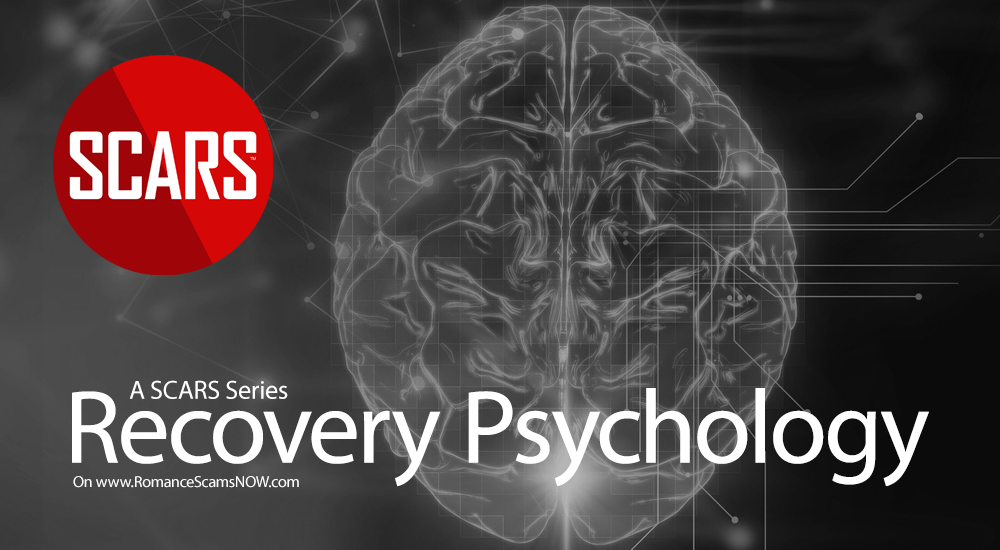
SCARS Institute’s Encyclopedia of Scams™ Published Continuously for 25 Years

What Is Doomscrolling And Why Is It So Bad For Online Scam Victims?
Doomscrolling is the act of compulsively scrolling through bad news or negative content on social media or other digital platforms, especially before bed or late at night. This behavior can have negative effects on mental health, such as increased anxiety and stress.
For online scam victims, doomscrolling can be particularly harmful. It can exacerbate feelings of shame, embarrassment, and isolation that often accompany falling for a scam. It can also make it more difficult for victims to focus on recovering from the scam and taking steps to protect themselves in the future.
Moreover, doomscrolling can make it easier for scammers to continue to prey on victims. Scammers often use fear and anxiety to manipulate their victims, and constant exposure to negative news and content can increase those feelings and make it more likely for victims to fall for additional scams or to be less vigilant in protecting their personal information.
How Do Online Scam Victims Exhibit Doomscrolling After Their Scam Has Ended?
In today’s world, online scams have become increasingly common, and their victims are often left feeling vulnerable, isolated, and anxious. Many victims turn to social media or online forums to seek support or share their experiences, but in some cases, this behavior can lead to a pattern of doomscrolling.
Doomscrolling refers to the act of compulsively scrolling through negative or distressing content online. This behavior can have a range of negative effects on mental health, including increased anxiety, depression, and stress. For victims of online scams, doomscrolling can be particularly harmful, as it can exacerbate feelings of shame, embarrassment, and isolation that often accompany falling for a scam.
So how do online scam victims exhibit doomscrolling after their scam has ended? Here are a few common ways:
Searching for information about the scam
After falling victim to a scam, it’s common for victims to want to learn more about what happened and how they can prevent it from happening again. However, this search for information can quickly turn into a pattern of doomscrolling, as victims spend hours combing through online forums, news articles, and social media posts related to the scam.
While it’s important to be informed and take steps to protect oneself from future scams, this constant exposure to negative content can be overwhelming and stressful. Victims may feel like they’re not making progress in their recovery, which can exacerbate feelings of hopelessness and anxiety.
Reading about other people’s experiences with similar scams
Online scams are often sophisticated and well-executed, meaning that victims may feel like they’re the only ones who have fallen for a particular scam. However, as victims start to seek support and share their experiences online, they may discover that they’re not alone.
While connecting with other victims can be a helpful way to process one’s own experience, it can also lead to doomscrolling behavior. Victims may spend hours reading about other people’s experiences with similar scams, which can reinforce feelings of shame, embarrassment, and isolation.
Obsessively looking at scammer profiles and photos
It is bad for scam victims to obsessively look at fake profiles and scammer photos for several reasons.
Firstly, constantly looking at fake profiles and scammer photos can trigger feelings of anxiety and stress, which can be detrimental to a person’s mental health. Victims may feel overwhelmed by the scope of the problem and powerless to do anything about it, which can lead to a sense of hopelessness and despair.
Secondly, obsessively looking at fake profiles and scammer photos can reinforce feelings of shame and embarrassment that are common among scam victims. Victims may feel like they should have known better or that they were somehow complicit in the scam, which can lead to a sense of self-blame and guilt.
Thirdly, this behavior can interfere with a victim’s ability to move on from the scam and focus on their recovery. Instead of taking concrete steps to address the situation, victims may become stuck in a cycle of doomscrolling and rumination that prevents them from making progress.
Finally, it’s important to remember that looking at fake profiles and scammer photos can be triggering and traumatic for some victims. Seeing images of the person who scammed them or the fake profiles used in the scam can bring up painful memories and emotions, which can be difficult to process.
While it’s understandable that scam victims may want to understand the scope of the problem and learn more about the tactics used by scammers, it’s important to do so in a way that prioritizes one’s mental health and well-being. Victims should seek support from friends, family, or professionals, take steps to protect themselves from future scams, and avoid engaging in behaviors that reinforce negative emotions or prevent them from moving forward.
Seeking out news stories or social media posts related to the scam
In some cases, victims may actively seek out news stories or social media posts related to the scam that they fell victim to. This behavior can be driven by a desire to understand the scope of the problem, stay informed about any updates or developments related to the scam, or warn others about the scam.
However, this constant exposure to negative content can be distressing and exacerbate feelings of anxiety and stress. Victims may feel like they can’t escape the negative emotions associated with the scam, which can make it difficult to move on and focus on recovery.
Dwelling on the financial impact of the scam
One of the most distressing aspects of falling victim to an online scam is the financial impact. Victims may lose thousands of dollars, which can have long-lasting consequences for their financial stability and well-being.
After the scam has ended, some victims may engage in doomscrolling behavior by obsessively checking their bank accounts, credit reports, and other financial information. This behavior can be driven by a desire to understand the full extent of the damage caused by the scam, but it can also reinforce feelings of anxiety and stress.
What Are The Negative Effects Of Doomscrolling?
Doomscrolling, or the habit of continuously scrolling through negative news or social media content, can have several negative effects on a person’s mental health and well-being.
Increased Anxiety and Stress
Doomscrolling can lead to increased anxiety and stress as a person is exposed to a constant stream of negative news and information. The human brain is wired to pay more attention to negative information, so doomscrolling can be particularly addictive and overwhelming. The constant exposure to negative content can also activate the body’s stress response, leading to physical symptoms such as headaches, muscle tension, and difficulty sleeping.
Mood Disturbances
Doomscrolling can cause mood disturbances such as sadness, anger, or irritability. Negative news and social media content can trigger emotional responses that can linger long after the scrolling has stopped. This can negatively impact a person’s mood and their ability to focus on other tasks or activities.
Reduced Productivity
Doomscrolling can be a major time-waster that reduces productivity and can interfere with a person’s ability to focus on work or other important tasks. Constantly checking social media or news feeds can lead to procrastination, distractions, and an inability to concentrate on other activities.
Sleep Disturbances
Doomscrolling can lead to sleep disturbances as exposure to negative news and information can make it difficult to relax and fall asleep. The blue light emitted by electronic devices can also interfere with the body’s natural sleep-wake cycle, leading to disrupted sleep patterns and insomnia.
Social Isolation
Doomscrolling can lead to social isolation as a person becomes more focused on their phone or computer screen than on interacting with others in real life. The constant exposure to negative news and social media content can also make a person more pessimistic and less inclined to engage in social activities.
Impact on Mental Health
Doomscrolling can have a negative impact on a person’s mental health and well-being. Prolonged exposure to negative news and social media content can increase symptoms of depression, anxiety, and other mental health conditions. It can also cause a sense of hopelessness or helplessness, leading to feelings of despair and low self-esteem.
Feelings of Anger & Hate
Doomscrolling can increase scam victim anger, frustration, and hate. When a person falls victim to a scam, they may experience a range of emotions, including anger, frustration, and betrayal. These emotions can be intensified by the experience of doomscrolling, as the victim is repeatedly exposed to negative information about scams and fraud.
Feelings of Helplessness and Hopelessness
Doomscrolling can also lead to feelings of helplessness and hopelessness, which can exacerbate these negative emotions. Victims may feel that they have been unfairly targeted by scammers and that there is little they can do to protect themselves from future scams. This can lead to feelings of anger and frustration that are directed at the scammers and the systems that allow scams to flourish.
Spreading Urban Legends and Misinformation
In addition, doomscrolling can contribute to the spread of misinformation and stereotypes about scammers and fraudsters. Victims may be exposed to sensationalized news stories or social media posts that paint all scammers as greedy, heartless criminals. This can fuel feelings of hatred and intolerance towards scammers and anyone who is perceived to be associated with them.
Negative Mental Health Effects
In addition to what was mentioned above, there are additional negative mental health effects for scam victims.
Impaired Cognitive Function
Doomscrolling can also impair cognitive function in scam victims. When a person is constantly exposed to negative information, their ability to think clearly and make decisions can be impacted. This can make it difficult for scam victims to take action to protect themselves or to make sound financial decisions.
Post-Traumatic Stress Disorder (PTSD)
Scam victims may be at increased risk of developing PTSD, a mental health condition that can occur after a traumatic event. The experience of being scammed can be traumatizing, and constant exposure to negative information about scams and fraud can further exacerbate this trauma.
Impaired Physical Health
Doomscrolling can have negative physical health effects on scam victims as well. Chronic stress and anxiety can contribute to a range of physical health problems, including headaches, muscle tension, and digestive issues.
How To Avoid Doomscrolling?
Here are tips you can use while you are recovering from your scams – from 0 – 12 months after the scam ends:
- Limit the amount of time you scroll through the new & social media to no more than an hour
- Do not spend any time looking at scammer photos or fake profiles
- Avvoid anti-scam hate groups completely
- Limit reading scam victims stories to one a day
- Avoid news about scammer arrests and convictions
- Limit your interaction with other angry scam victims
Summary
In summary, doomscrolling can have serious negative effects on a person’s mental health and well-being. It’s important to be aware of these potential risks and take steps to reduce the amount of negative news and social media content that you consume. This can include setting limits on your social media use, taking breaks from the news, and engaging in activities that promote relaxation and stress reduction.
If you have fallen victim to an online scam, it’s important to seek support and take steps to protect yourself, but it’s also important to limit your exposure to negative content and prioritize your mental health. This can include taking breaks from social media or limiting your consumption of news and other negative content.

-/ 30 /-
What do you think about this?
Please share your thoughts in a comment below!
Table of Contents
- How A Negative Behavior Can Cause Dramaticly Negative Effects On Scam Victims
- What Is Doomscrolling And Why Is It So Bad For Online Scam Victims?
- How Do Online Scam Victims Exhibit Doomscrolling After Their Scam Has Ended?
- What Are The Negative Effects Of Doomscrolling?
- Negative Mental Health Effects
- How To Avoid Doomscrolling?
- Summary
LEAVE A COMMENT?
Thank you for your comment. You may receive an email to follow up. We never share your data with marketers.
Recent Comments
On Other Articles
- on Love Bombing And How Romance Scam Victims Are Forced To Feel: “I was love bombed to the point that I would do just about anything for the scammer(s). I was told…” Feb 11, 14:24
- on Dani Daniels (Kira Lee Orsag): Another Scammer’s Favorite: “You provide a valuable service! I wish more people knew about it!” Feb 10, 15:05
- on Danielle Delaunay/Danielle Genevieve – Stolen Identity/Stolen Photos – Impersonation Victim UPDATED 2024: “We highly recommend that you simply turn away form the scam and scammers, and focus on the development of a…” Feb 4, 19:47
- on The Art Of Deception: The Fundamental Principals Of Successful Deceptions – 2024: “I experienced many of the deceptive tactics that romance scammers use. I was told various stories of hardship and why…” Feb 4, 15:27
- on Danielle Delaunay/Danielle Genevieve – Stolen Identity/Stolen Photos – Impersonation Victim UPDATED 2024: “Yes, I’m in that exact situation also. “Danielle” has seriously scammed me for 3 years now. “She” (he) doesn’t know…” Feb 4, 14:58
- on An Essay on Justice and Money Recovery – 2026: “you are so right I accidentally clicked on online justice I signed an agreement for 12k upfront but cd only…” Feb 3, 08:16
- on The SCARS Institute Top 50 Celebrity Impersonation Scams – 2025: “Quora has had visits from scammers pretending to be Keanu Reeves and Paul McCartney in 2025 and 2026.” Jan 27, 17:45
- on Scam Victims Should Limit Their Exposure To Scam News & Scammer Photos: “I used to look at scammers photos all the time; however, I don’t feel the need to do it anymore.…” Jan 26, 23:19
- on After A Scam, No One Can Tell You How You Will React: “This article was very informative, my scams happened 5 years ago; however, l do remember several of those emotions and/or…” Jan 23, 17:17
- on Situational Awareness and How Trauma Makes Scam Victims Less Safe – 2024: “I need to be more observant and I am practicing situational awareness. I’m saving this article to remind me of…” Jan 21, 22:55
ARTICLE META
Important Information for New Scam Victims
- Please visit www.ScamVictimsSupport.org – a SCARS Website for New Scam Victims & Sextortion Victims
- Enroll in FREE SCARS Scam Survivor’s School now at www.SCARSeducation.org
- Please visit www.ScamPsychology.org – to more fully understand the psychological concepts involved in scams and scam victim recovery
If you are looking for local trauma counselors please visit counseling.AgainstScams.org or join SCARS for our counseling/therapy benefit: membership.AgainstScams.org
If you need to speak with someone now, you can dial 988 or find phone numbers for crisis hotlines all around the world here: www.opencounseling.com/suicide-hotlines
A Note About Labeling!
We often use the term ‘scam victim’ in our articles, but this is a convenience to help those searching for information in search engines like Google. It is just a convenience and has no deeper meaning. If you have come through such an experience, YOU are a Survivor! It was not your fault. You are not alone! Axios!
A Question of Trust
At the SCARS Institute, we invite you to do your own research on the topics we speak about and publish, Our team investigates the subject being discussed, especially when it comes to understanding the scam victims-survivors experience. You can do Google searches but in many cases, you will have to wade through scientific papers and studies. However, remember that biases and perspectives matter and influence the outcome. Regardless, we encourage you to explore these topics as thoroughly as you can for your own awareness.
Statement About Victim Blaming
SCARS Institute articles examine different aspects of the scam victim experience, as well as those who may have been secondary victims. This work focuses on understanding victimization through the science of victimology, including common psychological and behavioral responses. The purpose is to help victims and survivors understand why these crimes occurred, reduce shame and self-blame, strengthen recovery programs and victim opportunities, and lower the risk of future victimization.
At times, these discussions may sound uncomfortable, overwhelming, or may be mistaken for blame. They are not. Scam victims are never blamed. Our goal is to explain the mechanisms of deception and the human responses that scammers exploit, and the processes that occur after the scam ends, so victims can better understand what happened to them and why it felt convincing at the time, and what the path looks like going forward.
Articles that address the psychology, neurology, physiology, and other characteristics of scams and the victim experience recognize that all people share cognitive and emotional traits that can be manipulated under the right conditions. These characteristics are not flaws. They are normal human functions that criminals deliberately exploit. Victims typically have little awareness of these mechanisms while a scam is unfolding and a very limited ability to control them. Awareness often comes only after the harm has occurred.
By explaining these processes, these articles help victims make sense of their experiences, understand common post-scam reactions, and identify ways to protect themselves moving forward. This knowledge supports recovery by replacing confusion and self-blame with clarity, context, and self-compassion.
Additional educational material on these topics is available at ScamPsychology.org – ScamsNOW.com and other SCARS Institute websites.
Psychology Disclaimer:
All articles about psychology and the human brain on this website are for information & education only
The information provided in this article is intended for educational and self-help purposes only and should not be construed as a substitute for professional therapy or counseling.
While any self-help techniques outlined herein may be beneficial for scam victims seeking to recover from their experience and move towards recovery, it is important to consult with a qualified mental health professional before initiating any course of action. Each individual’s experience and needs are unique, and what works for one person may not be suitable for another.
Additionally, any approach may not be appropriate for individuals with certain pre-existing mental health conditions or trauma histories. It is advisable to seek guidance from a licensed therapist or counselor who can provide personalized support, guidance, and treatment tailored to your specific needs.
If you are experiencing significant distress or emotional difficulties related to a scam or other traumatic event, please consult your doctor or mental health provider for appropriate care and support.
Also read our SCARS Institute Statement about Professional Care for Scam Victims – click here to go to our ScamsNOW.com website.
















I was a doomscroller in the first few months after my scam ended. I was looking for ways to understand how it all happened. Then I found SCARS and now put my time to great use, learning about how my brain functions and why I became a victim. The time I spend reading SCARS’ articles is an infinitely more productive use of my time.
It is a very helpful article. After the scam I avoided my social media apps because I felt so inferior, guilty, and ashamed. But during the covid 19 pandemic, I spent too much time scrolling down posts and news. And I did it was detrimental to my mental health, self-worth, and productivy
Thank you for this article. I briefly touched on doomscrolling when I was trying to locate help and finally found SCARS Institute. I had no desire to read scam stories or view photos or profiles. I wouldn’t know whom I was looking at anyway as I only knew the criminal(s) as impersonating a particular celebrity. As the celebrity had told me no one could know about my relationship with “him” and no photos ever were allowed in our texts – I have no idea what I would be looking for. Initially I searched the web to learn if anyone else had been affected by an imposter scam and the particular celebrity that was impersonated but I couldn’t find anything. I then turned my attention to finding the right help for me. I had no idea it was called “doomscrolling”.
I am glad I found SCARS institute Survivor School. The materials provided are the right amount for me to process and reflect then put it away and go on about my day.
I was just starting down the doomscrolling path when someone suggested SCARS to me. I’m so glad I took their advice. With SCARS I feel I am on the right path to recovery.